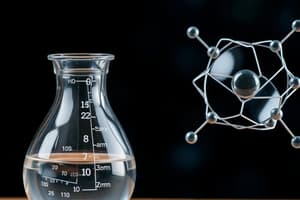Podcast
Questions and Answers
Natural sciences include the study of living organisms and life processes.
Natural sciences include the study of living organisms and life processes.
True (A)
The scientific method includes six steps: Observation, Question, Hypothesis, Experimentation, Analysis, and Verification.
The scientific method includes six steps: Observation, Question, Hypothesis, Experimentation, Analysis, and Verification.
False (B)
Formal sciences primarily focus on the study of natural phenomena.
Formal sciences primarily focus on the study of natural phenomena.
False (B)
Peer review is a process that ensures scientific work is assessed by professionals in the relevant field before it is published.
Peer review is a process that ensures scientific work is assessed by professionals in the relevant field before it is published.
Chemistry falls under the category of social sciences.
Chemistry falls under the category of social sciences.
Economic studies primarily deal with the production, distribution, and consumption of goods.
Economic studies primarily deal with the production, distribution, and consumption of goods.
A theory is merely a guess or hypothesis in scientific terms.
A theory is merely a guess or hypothesis in scientific terms.
Interdisciplinary research combines multiple fields of study to address complex issues.
Interdisciplinary research combines multiple fields of study to address complex issues.
Sociology is the study of individual mind and behavior.
Sociology is the study of individual mind and behavior.
Analysis in the scientific method involves conducting experiments.
Analysis in the scientific method involves conducting experiments.
Flashcards are hidden until you start studying
Study Notes
Definition of Science
- Systematic enterprise that builds and organizes knowledge in the form of testable explanations and predictions about the universe.
Branches of Science
- Natural Sciences
- Study of the natural world.
- Includes:
- Physics: Study of matter, energy, and forces.
- Chemistry: Study of substances and their reactions.
- Biology: Study of living organisms and life processes.
- Formal Sciences
- Study of abstract concepts.
- Includes:
- Mathematics: Study of numbers, quantities, shapes, and patterns.
- Logic: Study of reasoning and argument.
- Social Sciences
- Study of human behavior and societies.
- Includes:
- Psychology: Study of mind and behavior.
- Sociology: Study of social behavior and societies.
- Economics: Study of production, distribution, and consumption of goods.
Scientific Method
- Observation
- Gathering data through the senses.
- Question
- Formulating a question based on observations.
- Hypothesis
- Proposing a testable explanation for the observation.
- Experimentation
- Conducting experiments to test the hypothesis.
- Analysis
- Interpreting results to determine if they support the hypothesis.
- Conclusion
- Drawing conclusions and communicating results.
Key Concepts
- Theory vs. Law
- Theory: Well-substantiated explanation of an aspect of the natural world.
- Law: Statement that describes a consistent relationship observed in nature.
- Peer Review
- Process where scientific work is evaluated by experts in the field before publication.
Importance of Science
- Drives technological advancement.
- Informs policy decisions based on evidence.
- Enhances understanding of the natural world and human society.
- Promotes critical thinking and problem-solving skills.
Current Trends in Science
- Interdisciplinary research: Combining fields (e.g., bioinformatics, environmental science).
- Public engagement: Increased emphasis on science communication.
- Ethical considerations: Addressing dilemmas in research (e.g., genetic engineering).
Major Scientific Breakthroughs
- Theory of Relativity (Einstein): Revolutionized understanding of space and time.
- Germ Theory of Disease: Transformed medicine and public health.
- Quantum Mechanics: Fundamental theory in physics explaining nature at the smallest scales.
Definition of Science
- A systematic endeavor that constructs and organizes knowledge through testable explanations and predictions about the universe.
Branches of Science
-
Natural Sciences: Focus on the natural world, including:
- Physics: Examines matter, energy, and forces.
- Chemistry: Investigates substances and their reactions.
- Biology: Explores living organisms and their life processes.
-
Formal Sciences: Concerned with abstract concepts, including:
- Mathematics: Analyzes numbers, quantities, shapes, and patterns.
- Logic: Studies reasoning and the structure of arguments.
-
Social Sciences: Examine human behavior and societies, including:
- Psychology: Investigates mental processes and behavior.
- Sociology: Studies social interactions and societal structures.
- Economics: Analyzes production, distribution, and consumption of goods.
Scientific Method
- Observation: Collect data using sensory input.
- Question: Develop questions based on observed data.
- Hypothesis: Formulate a testable explanation for the observations.
- Experimentation: Carry out experiments to evaluate the hypothesis.
- Analysis: Interpret results to ascertain support for the hypothesis.
- Conclusion: Draw conclusions and disseminate findings.
Key Concepts
- Theory vs Law:
- A theory is a comprehensive explanation that is well-substantiated; a law states a consistent relationship observed in nature.
- Peer Review: A critical evaluation process where scientific works are assessed by professional experts prior to publication.
Importance of Science
- Fuels technological progress and innovation.
- Guides evidence-based policy-making.
- Enhances comprehension of both natural phenomena and societal dynamics.
- Fosters critical thinking and problem-solving skills.
Current Trends in Science
- Interdisciplinary Research: Merges various scientific fields (e.g., bioinformatics, environmental science).
- Public Engagement: Greater focus on science communication and public understanding of scientific concepts.
- Ethical Considerations: Addresses complex ethical dilemmas such as those in genetic engineering.
Major Scientific Breakthroughs
- Theory of Relativity (Einstein): A pivotal advancement that altered perceptions of space and time.
- Germ Theory of Disease: Revolutionized medical practices and public health initiatives.
- Quantum Mechanics: A foundational theory in physics that describes nature at atomic and subatomic levels.
Studying That Suits You
Use AI to generate personalized quizzes and flashcards to suit your learning preferences.




